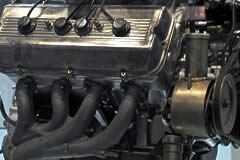Choosing between a 4 Cylinder and a 6 Cylinder Engine - Vol.282
When purchasing a vehicle, new or used, the type of engine is just as important as any other feature. Understanding the variations between the different engine types and sizes will help you to make an informed decision when choosing a vehicle.

What Is The Difference?
A 4 cylinder engine contains 4 pistons while a 6 cylinder contains 6, all driving the power of your engine. The easy answer would be more cylinders equals more power. Most small cars, light trucks, and even some small SUVs contain 4 cylinder engines. Four cylinder engines are typically inline engines (the 4 cylinders are in a straight line as opposed to a V shape like most 6 cylinder engines), making them smaller and lighter weight. This gives them greater fuel economy, but less power, making them ideal for smaller vehicles.
Most sedans, trucks, and full size SUVs contain a 6 cylinder or larger engine. These engines are larger in size, and weigh more than a 4 cylinder, and offer more power, but less fuel economy. They are ideal in larger vehicles because the additional power is necessary to efficiently move the larger and weightier vehicles.
Engine design and efficiency has changed and improved substantially in the past 10 years, leading to lighter weight engines with greater fuel economy. Therefore it is important to note that a newer 4 cylinder engine may have just as much power if not more, than a 6 cylinder from 10 years ago. Also, a newer 6 cylinder may have the same fuel economy or better than a 4 cylinder from 10 years ago. So make sure to take that into account when making your selection.
How Do I Chose Between The Two?
The easiest way to choose is to determine what size and type of vehicle best suits your needs and wishes, this will normally solve the engine question. As stated, 4 cylinder engines are smaller and lighter, but they also contain less parts which means there are less things to break. They can be cheaper to maintain, as opposed to the larger and heavier 6 cylinder engine vehicles.
A small car, truck, or SUV with a 4 cylinder engine is a good choice for someone looking for a vehicle to commute to and from work, and mostly local driving. These vehicles get excellent fuel economy, they are typically smaller, so families of 4 or 5 should be fine. On the down side they have less power, and are not suitable for heavy loads.
A sedan, full size truck, or full size SUV with a 6 cylinder or larger engine is a good choice for people with large families, those who travel long distances, or people who haul heavy loads, such as towing boats, campers, or hauling lumber or other building materials. On the down side you are losing fuel economy and they are typically more costly to maintain.
Additionally, many smaller 4 cylinder vehicles come with the option to upgrade to a 6 cylinder engine. This is ideal for people who have no need of a large vehicle, but feel a little more comfortable having the additional power of a 6 cylinder. Sports cars also typically have a 6 cylinder or larger engine, though most are only able to seat 2 persons, and have limited cargo space.
There are many different types of vehicles available, some with multiple engine choices. So take your time, figure out what you require in a vehicle to best meet your needs. Knowing the differences between these engines and their benefits, should ensure that you make an excellent and well informed choice.